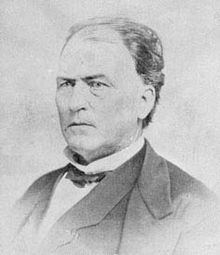Jesse D. Bright
| Jesse David Bright | |
|---|---|
 |
|
| Member of the Kentucky House of Representatives | |
|
In office 1867-1871 |
|
| President pro tempore of the United States Senate | |
|
In office June 12, 1860 – June 13, 1860 |
|
| Preceded by | Benjamin Fitzpatrick |
| Succeeded by | Benjamin Fitzpatrick |
|
In office June 11, 1856 – January 6, 1857 |
|
| Preceded by | Charles E. Stuart |
| Succeeded by | James M. Mason |
|
In office December 5, 1854 – June 9, 1856 |
|
| Preceded by | Lewis Cass |
| Succeeded by | Charles E. Stuart |
|
United States Senator from Indiana |
|
|
In office March 4, 1845 – February 5, 1862 |
|
| Preceded by | Albert S. White |
| Succeeded by | Joseph A. Wright |
| 9th Lieutenant Governor of Indiana | |
|
In office December 6, 1843 – March 4, 1845 |
|
| Governor | James Whitcomb |
| Preceded by | Samuel Hall |
| Succeeded by | Paris C. Dunning |
| Member of the Indiana Senate | |
|
In office 1841-1843 |
|
| Personal details | |
| Born |
December 18, 1812 Norwich, New York, US |
| Died | May 20, 1875 (aged 62) Baltimore, Maryland, US |
| Political party | Democratic |
| Profession | Politician, Lawyer, Judge |
Jesse David Bright (December 18, 1812 – May 20, 1875) was the ninth Lieutenant Governor of Indiana and U.S. Senator from Indiana who served as President pro tempore of the Senate on three separate occasions. He was the only senator from a Northern state to be expelled for being a Confederate sympathizer. As a leading Copperhead he opposed the Civil War.
Born in Norwich, New York, Bright was born into a German family. Bright moved to Madison, Indiana, with his parents in 1820 and attended public schools as a child. He studied law and was admitted to the bar in 1831, commencing practice in Madison. He was elected a judge of the probate court of Jefferson County, Indiana, in 1834, was a United States Marshal for the district of Indiana from 1840 to 1841 and served in the Indiana Senate from 1841 to 1843. In 1842, he was elected Lieutenant Governor of Indiana and served as such from 1843 to 1845.
Bright was elected a Democrat to the United States Senate in 1844, was reelected in 1850 and 1856, serving from 1845 to 1862. He was chairman of the Committee on Enrolled Bills from 1845 to 1847, of the Committee on Public Buildings from 1845 to 1847, of the Committee on Revolutionary Claims from 1847 to 1849, of the Committee on Roads and Canals from 1849 to 1855 and of the Committee on Public Buildings and Grounds from 1857 to 1861. He was also President pro tempore of the Senate from 1854 to 1856, 1856 to 1857, and in 1860, serving as putative Acting Vice President of the United States in the first two terms due to the death of Vice President William R. King.
...
Wikipedia
